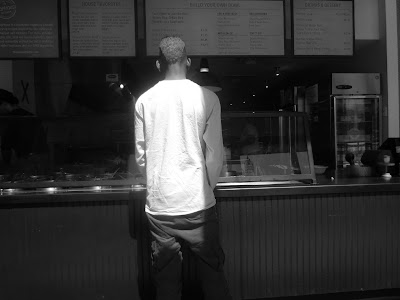He is dark, 5ft 7 inches. On most days he’ll wear a hoodie and a pair of jeans. As I watch him walk to the bus I think, there goes my baby
– my Japadhola/Mufumbira/ Etesot. A Ugandan boy who holds no grudges for his
ethnicity. In the world we live in, he is a “Young black man!” - not the
description I would use for my son, but like the police here would say – “he
fits the profile.” Can one tell that he is not an angry black man when he walks
into a store with a hoodie? In moving to America I exchanged one set of issues
for another.
We are Ugandan and proud. The “black” label is foreign even
though it’s the color of our skin. Having grown up among fellow “blacks” there
was no conscience for skin color. People were referred to by their title, name
or gender – judged by the content of character, family background (sometimes tribe)
and one’s status in society. Yes we studied slave trade in history, it was a
despicable era but not a problem we owned. Tucked away in landlocked Uganda, I
left the stories of slave trade in the history text books and the exam room
when the examiner said “put down your pens”. Now, living in America I see the
after effects - the struggle for justice and fair treatment.
As my son inches up to his dad’s height, as his voice
deepens and he begins to feel his way around searching for independence and
individuality, the issue of safety comes to the fore ground. My mom held my
hand as I crossed Kampala road, she said, make sure to look both ways before
you cross. She said, don’t stay out too late and choose your friends wisely.
Make sure to lock the doors and draw the curtains. My brothers were cautioned
not to throw stones and to be careful when climbing trees. These are some of the issues my parents
grappled with when raising us. Today my concerns are, “perhaps you shouldn’t
wear that hoodie, okay, at least don’t cap it over your head. What if something
happens and you are in the vicinity?” As the kids grow older friendships
shuffle and narrow to mono hues. There is the unconscious influence of society.
The adage birds of the same feather flock together comes home to roost.
The concept of color and its implications is still foreign
in my sons developing mind but the media does an impressive job of placing it
front and center. Hash tags like black and proud and black lives matter flood
social media and we make an effort to put it in perspective because you see
even though #BlackLivesMatter might sound like a joke, here it connects a race.
One day my son asked, “Daddy, where do we come from?” His
dad begun to explain the migration of the Nilo-tics and the Nilo-Hamites across
the river Nile valley in East Africa. An awareness of his parent’s origin not
only fascinated him but satisfied a curiosity and a need to belong. I watched
as his chest popped out, he squared his shoulders and listened with intent
fascination. I later learned that it
informed his response when the question was paused to him by classmates. Growing
up I visited grandparents in Serere and Kumi often enough that in hind sight my
parents addressed the question of our identity subconsciously. The next time he
asked “Daddy did either you or Mummy’s parents travel out of Uganda?” or “Were
any of my grandparents famous?” It was important to give a detailed response.
Color and race in America are sore spots. At one point it
was a distant issue but when a fellow Ugandan gets caught in an altercation
with the police and loses his life, I realize it’s not far any more. It could
be my husband or my son and so we master the safety rules. When stopped by police – keep your hands in
plain sight, follow instructions, don’t make sudden movements, and obey the
law.
Ahh! This is panda gari American
style.
(Panda gari is Swahilli for - "Get in the car". It was a term used by soldiers during the 70's to arrest people en mass - some were not seen again).





No comments:
Post a Comment
Hey! Thanks for dropping by :-)